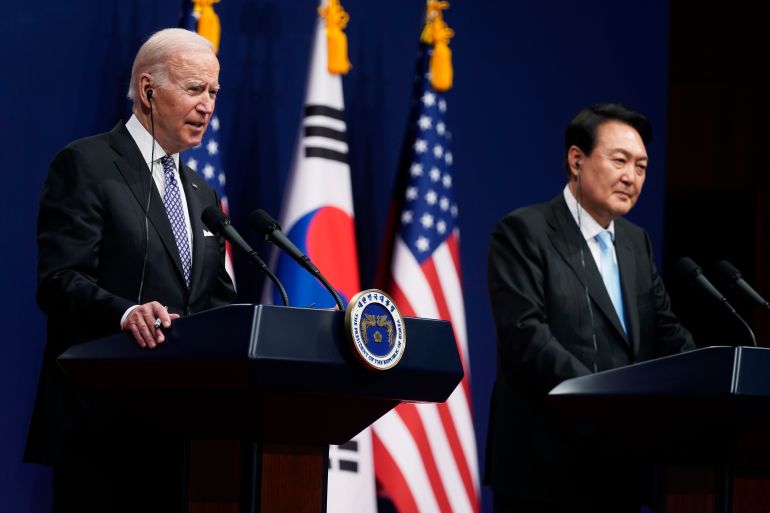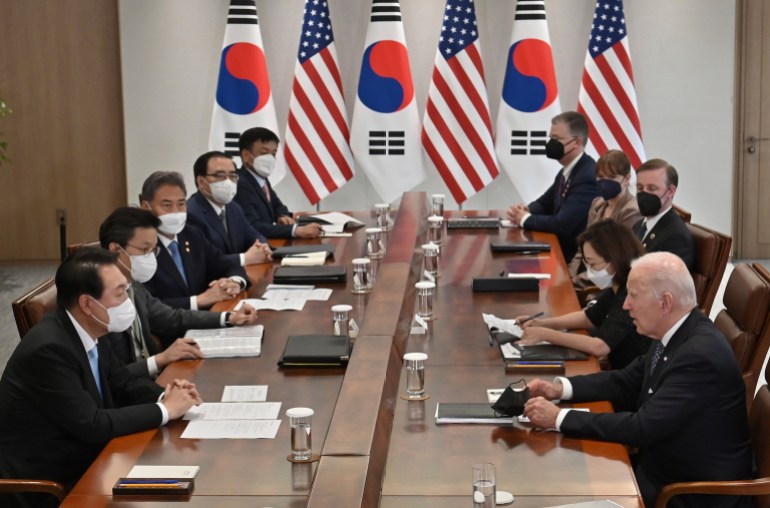Biden, Yoon mull more military exercises amid N Korea tensions
Pyongyang’s nuclear and missile programme tops the agenda as Yoon hosts Biden for their first in-person talks in Seoul.

Seoul, South Korea – The leaders of South Korea and the United States have agreed to consider expanding the scope and scale of their joint military exercises amid a sharp rise in weapons tests from North Korea since the beginning of the year.
President Yoon Suk-yeol and his US counterpart, Joe Biden, announced the move in a joint statement on Saturday following their first summit in South Korea’s capital, Seoul.
Keep reading
list of 4 items‘Difficult to believe’: Biden’s economy plan a tough sell in Asia
North Korea shuns outside help as COVID catastrophe looms
Biden visit to test South Korean leader’s tough talk on China
“The two presidents share the view that [North Korea’s] nuclear program presents a grave threat not only to peace and stability on the Korean peninsula, but also the rest of Asia and the world,” the statement said.
“Both leaders condemn [North Korea’s] escalatory ballistic missile tests this year,” it said.
The statement also outlined other measures, including a promise to deploy strategic US military assets – such as fighter jets, bombers and missiles – to South Korea, and committed to identifying “new and additional steps” to reinforce deterrence.

The two leaders, however, also offered assistance to North Korea, expressing concern over a growing COVID-19 outbreak in the impoverished and isolated country that has infected an estimated two million people and killed at least 66.
“With regard to the ongoing COVID-19 crisis, we are willing to provide active assistance from the perspective of humanitarianism and human rights separately from political and military perspectives,” Yoon told reporters after the two-hour summit.
“I call on North Korea to respond to this proposal positively and begin taking practical steps towards denuclearisation.”
Biden added that Washington had already offered COVID-19 vaccines to Pyongyang, but “got no response”. He also said any meeting between him and North Korea’s Supreme Leader would depend on whether Kim Jong Un was “sincere and whether it was serious”.
‘Door for dialogue’
Yoon – who won a March election promising a tougher line on North Korea – also reiterated an openness to diplomacy.
“The door for dialogue is open,” said the South Korean leader, who took office 11 days ago. “If North Korea embarks on substantial denuclearisation, we will prepare an audacious plan to improve North Korea’s economy and the quality of life for North Korean people in cooperation with the international community.”
There was no immediate comment from North Korea.
But any enhanced South Korea-US military cooperation is likely to anger the government there as Pyongyang views the joint drills as a rehearsal for invasion.
Yoon and Biden, in addition to boosting military ties, also agreed on the need to strengthen their 70-year old alliance – forged after the US intervened to help South Korea fight back against invading North Korean troops in 1950 – to meet the challenges of a changing world order.
That includes promoting a rules-based international order amid Russia’s invasion of Ukraine as well as a “free and open” Indo-Pacific region, a reference to countering China’s growing economic and military influence in the area. Their statement also noted the importance of “preserving peace and stability” in the Taiwan Strait, where Beijing has stepped up military pressure on Taiwan, a self-governed island that it claims as its own.
The joint statement is the first key outcome of Biden’s Asia trip that also includes a visit to neighbouring Japan.
In Tokyo, the US president will launch the Indo-Pacific Economic Framework (IPEF), an agreement that seeks to set standards on supply chains, worker protections, decarbonisation and anti-corruption. South Korea is expected to be an inaugural member. Biden will then take part on Monday a meeting of the Quad, an informal grouping that comprises the US, Japan, Australia and India.
The five-day Asian tour is Biden’s first as president and is part of an effort aimed at reassuring allies of the US’s commitment to the Indo-Pacific region, despite Washington’s focus on supporting Ukraine against Russia.
Both South Korea and Japan are key players in the US’s Indo-Pacific strategy, and Biden told reporters that it was “critically important” that the two neighbouring countries improve relations after their ties soured in recent years over historical feuds and territorial issues – particularly amid what he described as an “inflection point in world history”.
“Things are changing so rapidly,” Biden said. “I think you’re seeing that – what you’re going to see more of is this is going to be competition between democracies and autocracies.”
And to address those challenges, democracies in the Indo-Pacific needed to “cooperate much more closely, not just militarily, but economically and politically,” he said.
There was no immediate comment from China.
Ahead of the Yoon-Biden summit, however, a top Chinese envoy said he hoped the US will “work with countries in the region to promote solidarity and cooperation in the Asia-Pacific, instead of plotting division and confrontation”.
Liu Xiaoming, the Chinese envoy for Korean affairs, said on Twitter that the US “should join efforts to foster an open and inclusive ‘circle of friends’ in Asia-Pacific, instead of putting together a closed and exclusive ‘clique’.
He added, “It should do more to contribute to peace and development in the Asia-Pacific, instead of creating turbulence and chaos in the region.”
It should join efforts to foster an open & inclusive “circle of friends” in #Asia-Pacific, instead of putting together a closed & exclusive “clique”. It should do more to contribute to peace & development in the Asia-Pacific, instead of creating turbulence & chaos in the region.
— 刘晓明Liu Xiaoming (@AmbLiuXiaoMing) May 21, 2022